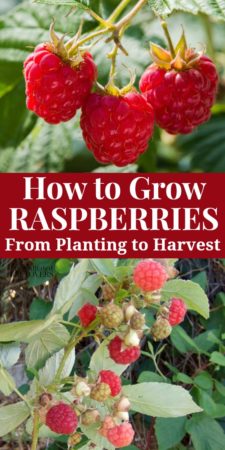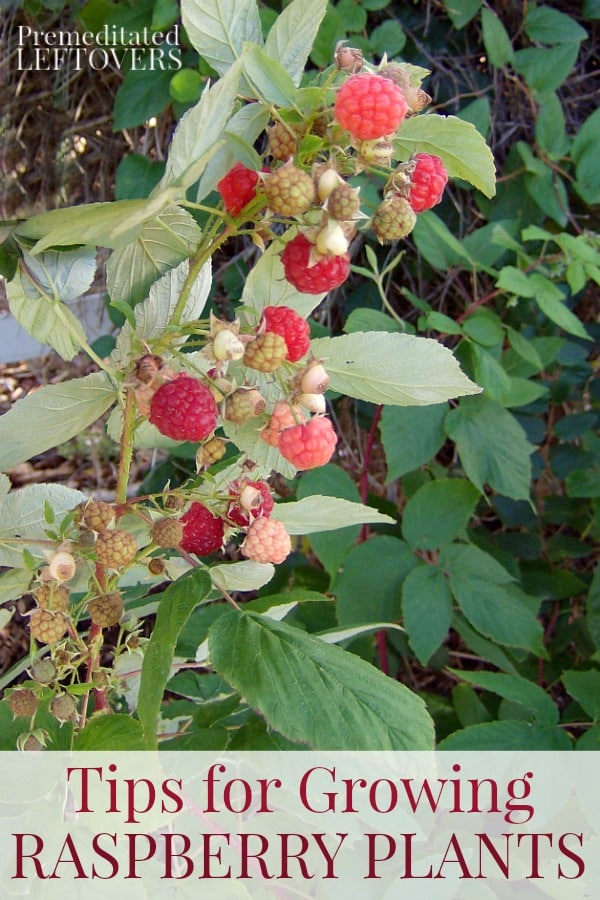Use these tips for growing raspberries to add this perennial fruit to your garden.

It seems as though everyone loves raspberries. And why shouldn’t they? Raspberries are a sweet summer treat that goes with everything. If you are curious about growing raspberries, take a peek at these tips for growing raspberries in your own garden.
Tips for Growing Raspberries
How to plant raspberries
Raspberry plants can be planted in the early spring. There are a few steps you need to take prior to planting. First, enrich the soil in the planting bed with mulch or compost. Next, soak the roots of the raspberry plants in water so they have time to hydrate. Raspberry plants love water.
When you are ready to plant, dig a hole that is 3 inches more than the length of the root ball. You want to be sure all plants are spaced at least 3 feet apart, and if you are planting in rows, the rows should be at least 7 feet apart.
How to grow raspberries in containers
Growing raspberries in containers is possible. Only plant one raspberry plant per pot. Also be sure your pot is at least 18 inches deep and 18 inches wide. You will need a roomy pot in order to accommodate the raspberry plant. Be sure there are plenty of drain holes as well so moisture doesn’t accumulate.
How to care for raspberry plants
Raspberry plants love moisture, so be sure you are giving them at least 2 inches of water per week. Like most garden plants, a layer of mulch can help retain moisture in the plant.
Your plants may also need some support. A trellis or berry cage can offer support as well as keep the fruit off the ground. This will prevent loss and rotting fruit.
General tips for producing a good crop
Your raspberry plant will produce canes as it grows. You can remove the canes once they turn brown. Be vigilant about checking the plant for rot, pest damage, or discoloration. Remove these portions as you find them.
As far as pests, not too many bugs are attracted to this plant. Should you see any, you can use a food safe pest product, drape a thin netting over the plant, or provide suitable fencing. These options combined will help with bugs as well as birds.
Pruning is not required since the raspberry bushes will actually form into thickets. If you want a more organized plant, feel free to trim as needed.
When and how to harvest raspberries
Raspberries are ready to harvest two weeks after the bud appears. They are typically nice and full and bright in color. They should fall easily from the vine when touched. During the summer, try to harvest daily.
How to divide raspberries
Try to divide plants in the early spring before the thickets form. Dig up smaller, weaker plants and transport them to another space or pot.
Once your raspberries are picked, you can either eat them plain or freeze them for later. They are great in smoothies, desserts, dessert toppings, jams, and so much more. Give these tips for growing raspberries a try!
More Tips for Growing Berries
DIY Planter Box for Berries and Other Fruits





Julie says
What causes white spots on the ripe raspberries? Is this like a sunburn?
Tracy says
My raspberries have turned bitter over the years. Is my soil missing something?
Liz Stoddard says
Have had no luck with my raspberry’s producing fruit and are in two minds to pull them out. What am I doing wrong?
Carol says
Is there any special protection for winter?
Alea Milham says
I add extra mulch, but they do just fine throughout our winters. We sometimes go as low as -17 F in Northern Nevada.
Danielle says
I just harvested my first Fall Gold raspberries off of a 2 year old plant that I’ve had in a large nursery pot. Wonderful tastes like sunshine. I hope to plant it out this fall or spring – always wonder when is best for fall gold because it’s an ever earring variety. They do love water and good drainage at the same time. So excited to pick even more next year!
Crystal Cabellon says
We planted 8 raspberry plants two years ago. They produced a few berries last year. Then this spring we noticed “dozens” of little plants filling the elevated 3’x7′ planter box we’d planted them in. We neglected to remove any of these new raspberry plants. Now we have; like the song says; a jungle out there. How did they multiply so fast and so abundantly. I had read that each plant would only get 1 new stalk each year and we were to prune out the old brown stalk. Did the roots to mass produce? I wish my asparagus had done this instead of the raspberries.
Cathy Bishop says
Raspberries are very invasive and will take over your yard if you let it.
ormis says
Only everbearing raspberries are invasive. They produce shoots. Everbearing raspberries are the best in my opinion. When I notice shoots I just pull them. If not get non everbearing raspberries
lee says
Wondering a couple things.
1 should the plants be cut way back after harvest
2 are there any plants that not be planted in the Betty vicinity?
3 how many years are the plants good for and do you need to put in new plants to keep a harvest going so there is no gap in berries.
4 do you get a harvest the first year of planting?
Grace says
I have had raspberries growing for years. I can tell you that I have never cut them back and they produce but they take time to get started. The plants ar good for many years but you do not typically get a harvest the first year.
They are invasive and take over the section they are planted in so consider that. I planted 1 plant 3 years ago and now have 20+. If you live in a warmer climate or get hot afternoon sun they like to be shaded in the PM. This is why they grow in thickets at the edge of forests.
Bev says
I have never tried to grow berries, but I would love to! My family is hopefully going to plant seeds today — this has inspired me to try out raspberries. Thanks for sharing, stopping by from Foodie Fridays!
Sharon - Her Organized Chaos says
Thanks for these tips! Every time I see gardening tips, I get more and more excited about my garden! I would love if you shared this at Totally Terrific Tuesday! Hope to see you there!
Sharon
Her Organized Chaos